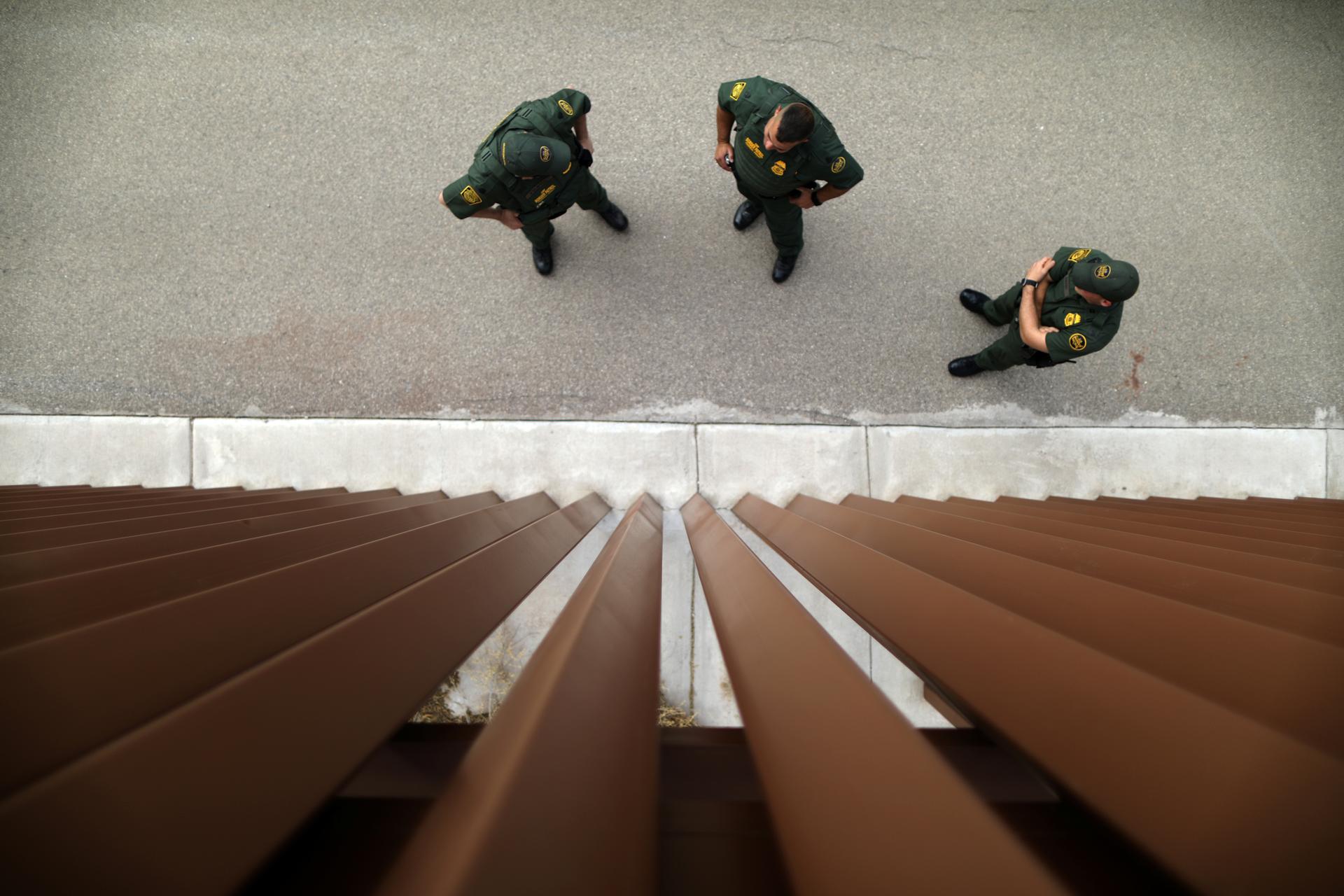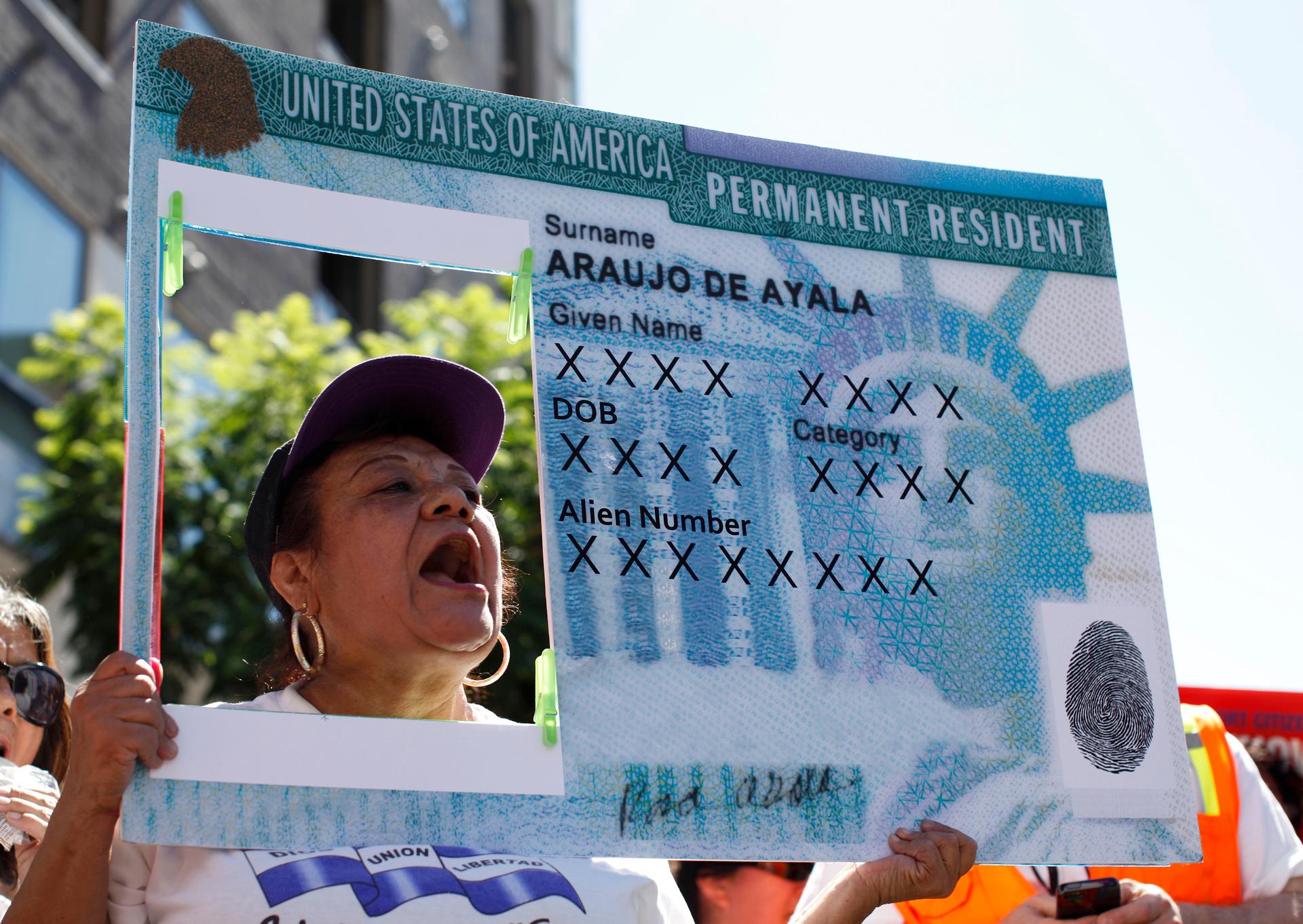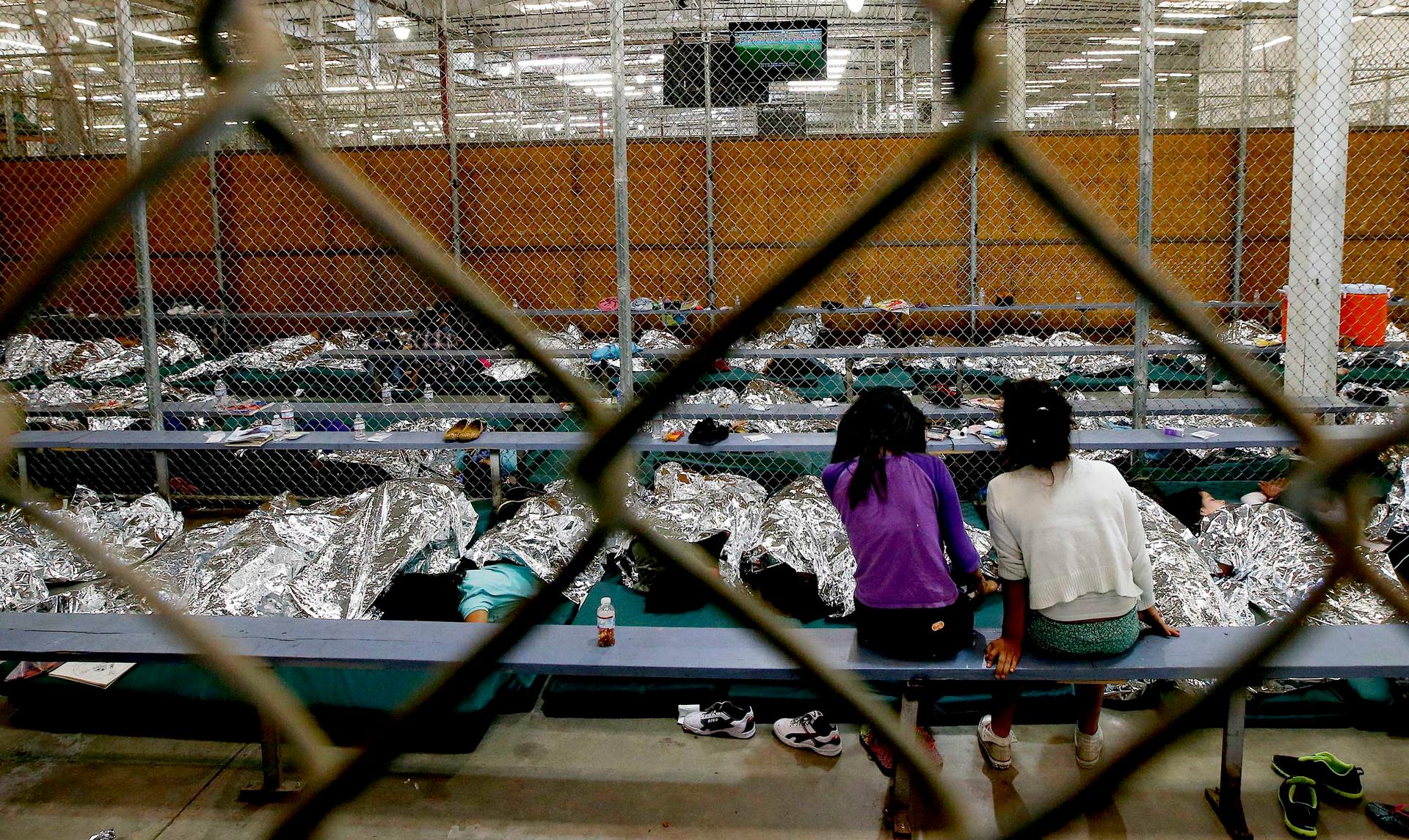Two young girls watch television in a holding area where hundreds of mostly Central American immigrant children were being processed and held at the US Customs and Border Protection Nogales Placement Center in Nogales, Arizona, June 18, 2014.
For the first time, US immigration officials are seeking to deport children who have received a special status for vulnerable migrants and are in the final stages of getting their green cards.
State judges and immigration authorities can jointly grant children a special humanitarian designation known as Special Immigrant Juvenile Status if they decide undocumented children have been abandoned, abused or neglected by one of their parents in their home country. Children who qualify are given a US Social Security number, a work permit and a green card.
Now, a group of children from Central America who are close to becoming legal permanent residents face imminent deportation after US Immigration and Customs Enforcement declined to close their deportation cases in February.
Children in the same scenario have previously completed the process without facing similar threats of deportation.
“The immigration administration is saying they don’t care — that the risks that lie beyond the border are not their problem,” said Leon Rodriguez, who oversaw the granting of the humanitarian status as director of US Citizenship and Immigration Services until early 2017.
V.G. is one of the first children with the status to be placed in deportation proceedings while he waits for his green card.
He had become desperate to evade the aggressive recruitment of gangs in his rural hometown in El Salvador, and in the fall of 2015, when he was 14, he and his mother decided to seek refuge in the United States. They crossed into the US by swimming across the Rio Grande. Hours later, they were arrested by US immigration authorities and readied for deportation.
Before they could be sent back, V.G. made the case to a family court judge in Pennsylvania that he deserved a special humanitarian designation for migrant kids because he’d been abandoned by his father in El Salvador, and gangs in his home country have been known to prey on vulnerable teens.
When Congress created the status in 1990, it called on family courts to decide whether the children qualify for humanitarian protection. The migrant then submits an application, which is approved or denied by DHS.
Because the court found that he had been abandoned and it was not in his best interest to be returned home, V.G. was granted Special Immigrant Juvenile Status. He is referred to only by his initials in court documents because he is considered a vulnerable minor.
V.G. and three other children in his situation are challenging their impending deportation. In a federal court in Southern California, they are trying to force the government to reopen their deportation cases. They will make their case to a judge on July 10.
They have also filed a class-action lawsuit in Pennsylvania, where they are being detained with their mothers, that argues that in trying to deport the children, the U.S. government is violating the US Constitution and federal immigration laws. A panel of judges could make a decision as early as this summer.
Bridget Cambria, a Pennsylvania attorney who represents V.G. and the three other children who are in a similar situation, said these cases could have far-reaching impact on whether more children with the status will be deported.
“It’s incredibly important for Special Immigrant Juvenile Status kids nationwide,” Cambria said, “and it shows where our values are with respect to the immigration system and whether we care about the most vulnerable children.”
The US government granted the status to about 15,000 children in 2016. Between January and March of this year, the government granted nearly 80 percent of the 5,114 requests for the status.
The decision comes under increased use of rapid deportation
A Pennsylvania judge and the US Citizenship and Immigration Services, a branch of the Department of Homeland Security, have decided that V.G. deserves to stay in the United States.
But another arm of DHS, Immigration and Customs Enforcement, says he must go. And, under what’s known as “expedited removal,” immigration officials can skip the traditional removal process in front of immigration judges.
Instead, officials are given wide latitude to deport migrants under expedited removal, if those migrants are captured within 100 miles of the US border, have been in the country for less than two weeks and don’t have valid travel documents.
Under this deportation regime, the US government has freedom to deport migrants like V.G. and his mother — who were found soon after they crossed the border without immigration papers — with little due process and limited ways for migrants to contest the order.
President Barack Obama made wide use of the policy, and President Donald Trump favors expanding it further.

Created in 1996, the expedited removal policy has been controversial since the start. Those who seek to tighten the borders laud the policy for its efficiency and for promoting deterrence. But immigrant and asylum advocates say that it lacks checks and balances and gives too much discretion to border patrol agents.
But it’s a policy susceptible to errors without a meaningful process to correct them.
Once an immigration official has placed a migrant into expedited removal, there are few ways to contest it. People who can show they are authorized to live in the country are able to challenge expedited removal in federal court. Asylum-seekers also have a chance to make a case that they have a fear of returning to their home countries, but they cannot appeal an unfavorable decision.
Everyone else is returned to their home countries as quickly as possible. They are then barred from returning to the United States for five years.
The US Commission on International Religious Freedom, which has observed expedited removal proceedings since 2005, has found “serious flaws placing asylum seekers at risk of return to countries where they could face persecution.” The ACLU has also documented a case of an asylum-seeker who was quickly deported, only to be raped after she was sent back across the southern border.
Multiple US citizens have been accidentally deported through expedited removal. Foreign workers and tourists with valid visas have also been turned away, prompting a judge to write in a 2010 decision that the expedited removal process is “fraught with risk of arbitrary, mistaken, or discriminatory behavior.”
Nonetheless, various courts across the country have agreed that the law is clear: The courts cannot intercede in expedited removal cases, even if there’s a reason to believe the outcome was unjust.
This has put kids like V.G. in legal limbo, stuck between two competing government mandates. They have a special status to stay in the United States. At the same time, the Department of Homeland Security says it has the authority to deport them.
Immigration officials declined to comment on pending litigation. But in court documents filed in V.G.’s case, the government says the children’s deportation orders are final and their special status doesn’t change things, especially since they have not yet received their green cards.
V.G.’s attorneys argue, among other things, that a federal court has previously required the government to revisit the deportation orders of children once they’re granted the humanitarian status.
That requirement, they say, also extends to expedited removal cases.
How V.G. got sent into deportation
Most deportations under expedited removal happen faster than lawyers or immigrant advocates can ever know about them, but V.G. has been able to remain in the country because he and his mother asked for asylum at the border.
Soon after V.G. and his mother arrived in Texas, an immigration agent interviewed them. V.G.’s mother said that she and her son were afraid to return to El Salvador because they had been menaced by gangs. The agent found her testimony credible but didn’t think her fears fit the contours of an asylum claim, which requires that migrants be members of a targeted class of people in their home country.
The decision sent V.G. and his mother into deportation proceedings.

They were able to put a pause on their removal when they joined a 2015 lawsuit, along with more than five dozen women and children, that asked the federal courts to revisit their asylum claims. They argued that the interviews with immigration had been mishandled and that they hadn’t been given an opportunity to fully explain the dangers they faced at home.
Last year, the judge overseeing that case confirmed that the courts cannot review the decisions that the Department of Homeland Security makes in cases of expedited removal. V.G. and his mother were back in line to be deported.
V.G. has been detained for nearly two years
The Department of Homeland Security typically detains migrants in expedited removal until they are deported – often a matter of hours or perhaps weeks. But with their legal challenges dragging on, V.G. and his mother have been detained in immigration facilities for nearly two years as they have waited on the outcome of their cases. They are currently being held in the Berks Family Residential Center in southeast Pennsylvania.
The fact that V.G. and other children with special humanitarian status remain detained has sparked outrage among legislators such as Sen. Bob Casey, D-Penn., who wrote a letter to the Department of Homeland Security in May that demanded their immediate release.
“The Department of Homeland Security should be focused on apprehending and deporting violent felons and maintaining a secure border, rather than expelling young mothers and children fleeing near certain death in their home countries,” said the letter, which was signed by 22 legislators. “We urge you, to release these families to their sponsors and allow them a fair hearing of their case.”
The letter has had little effect, although a federal court recently reiterated that children like V.G. — even those under expedited removal — must be released from detention centers after a maximum of 20 days.
Yet more legal papers will need to be filed in court before V.G. is released. In the meantime, he spends most of his day filling out math and English worksheets in a room that has been converted into an all-ages school. Sometimes he plays computer games or goes outside when the weather is nice.
But he can’t help but feel dispirited by his years-long detention. In a mental health report filed with the court, he told a psychologist that he feels hopeless and he’s stopped trying to make friends because he’s seen so many kids come and go. Sometimes, he said, he thinks about breaking a window and jumping out.
V.G. celebrated his 16th birthday in detention. As a reminder that there could be a life outside detention and deportation, he received an employment authorization card from the U.S. government earlier this year. In the picture, he looks serious and slightly stunned. His eyes are wide and dark, and his hair resolves in a gentle widow’s peak on his forehead.
But so far, there’s been no way for him to put the card to good use.
This story was originally published by Reveal from The Center for Investigative Reporting, a nonprofit news organization based in the San Francisco Bay Area. Learn more at revealnews.org and subscribe to the Reveal podcast, produced with PRX, at revealnews.org/podcast. ![]()
